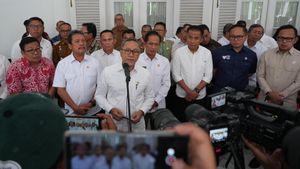JAKARTA - Every country must have a constitutional law that regulates associations or institutions in a country. In Indonesia, constitutional law is a law used to define the relationship between institutions, namely the executive, legislative, and judiciary.
This rule in Dutch is called staatsrecht. Then in English, it is known as Constitutional Law, aka constitutional law. However, the law serves the same purpose.
Definition of constitutional law
There is no exact same formula regarding the notion of constitutional law as law and a branch of legal knowledge among legal experts.
This difference may be caused by differences in the perspectives of experts and differences in the legal system adopted by the state being the object of research.
According to A. Sakti Ramadhon in the book Basics of Constitutional Law: An Introduction to Constitutional Law in a Theoretical-Philosophical Perspective, (2019), constitutional law is a study of legal science that has a broad and dynamic field of study. Thus, it is difficult to find a unification of the definition of constitutional law.
Meanwhile, constitutional law expert Cornelis van Vollenhoven defines constitutional law as the law that regulates all superior and subordinate legal societies according to their levels, and determines the institutions in the legal community concerned, and determines the structure and authority of the institutions.
Then, according to Moh Kusnardi and Harmauly Ibramin, constitutional law is a set of legal regulations that regulate state organization rather than state, relations between state equipment in vertical and horizontal lines, as well as the position of the state and its human rights.
The Purpose of constitutional law
Based on the explanation above, it can be concluded that state constitutional law aims to examine several crucial aspects, namely the state organs, the relationship between state institutions, and the relationship between state institutions and their citizens.
Meanwhile, Usep Ranawijaya conveyed that constitutional law regulates issues related to the following:
- General structure of state organizations
- Administrative institutions
- Arrangement of people's political life
- History of the development of the state administration
Examples of constitutional law cases in Indonesia:
1. Sabu Raijua regional election dispute
The Sabu Raijua regional election dispute arose because the elected Sabu Raijua regent, Orient Patriot Riwu Kore, was a citizen of the United States (US).
This case began to surface in early February 2021. No doubt, Orient's opponents in the Sabu Raijua Pilkada, namely the pair Nikodemus N Rihi Heke-Yohanis Yly Kale filed a dispute over the Regional Head Elections (Pilkada) to the Constitutional Court (MK) regarding the citizenship polemic of the elected Regent Orient Riwu Kore.
This condition caused Orient to cancel his appointment as Regent of Sabu Raijua because he was still a citizen of the United States.
Orient admitted that he had submitted an application for relinquishment of US citizenship in August 2020. However, the US Embassy in Jakarta did not follow up on the request on the grounds of the COVID-19 pandemic.
"Orient applies for the relinquishment of citizenship by filling in the official form of a request for determination of possible loss of United States citizenship through the United States of America", said Orient's attorney, Paskaria, quoted from Antara.
Now, the dispute over the 2020 Sabu Raijua Regional Election is still being handled by the Constitutional Court.
2. SBY gave clemency to a marijuana smuggler from Australia, Schapelle Corby
Schapelle Corby is an Australian citizen who was arrested by authorities at Ngurah Rai Airport, Bali in October 2004 for carrying 4.1 kilograms of marijuana.
On May 27, 2005, Corby was sentenced to 20 years in prison and fined USD 13.875. Next, on 13 October 2005, or a year after her arrest, Corby's sentence was relaxed to 15 years in prison by the Bali High Court.
The prosecutor then appealed the verdict, and three months later, the Indonesian Supreme Court returned the 20-year sentence for the defendant.
On April 13, 2010, Corby filed clemency with President Susilo Bambang Yudhoyono (SBY), arguing that she was suffering from depression in Kerobokan Prison and that her life was at risk if she was there.
Corby begged the president to cancel her sentence and reduce her sentence.
Two years after it was submitted, to be precise on 15 May 2012, President SBY granted clemency to Corby. However, Corby was only released on parole on 10 February 2014, and on 25 May 2017, Corby was deported to her home country, Australia.
The English, Chinese, Japanese, Arabic, and French versions are automatically generated by the AI. So there may still be inaccuracies in translating, please always see Indonesian as our main language. (system supported by DigitalSiber.id)













